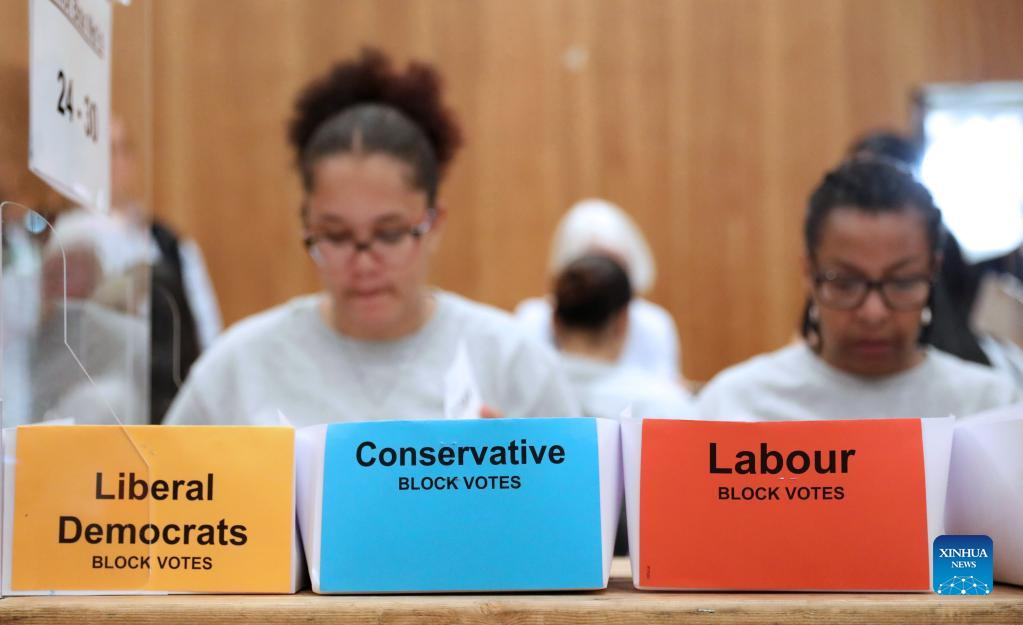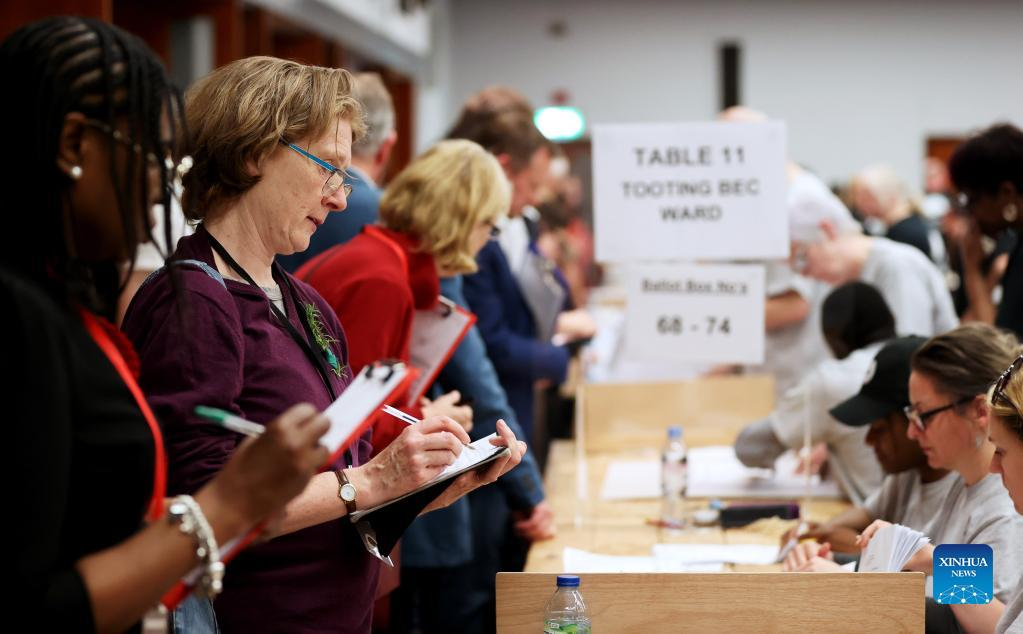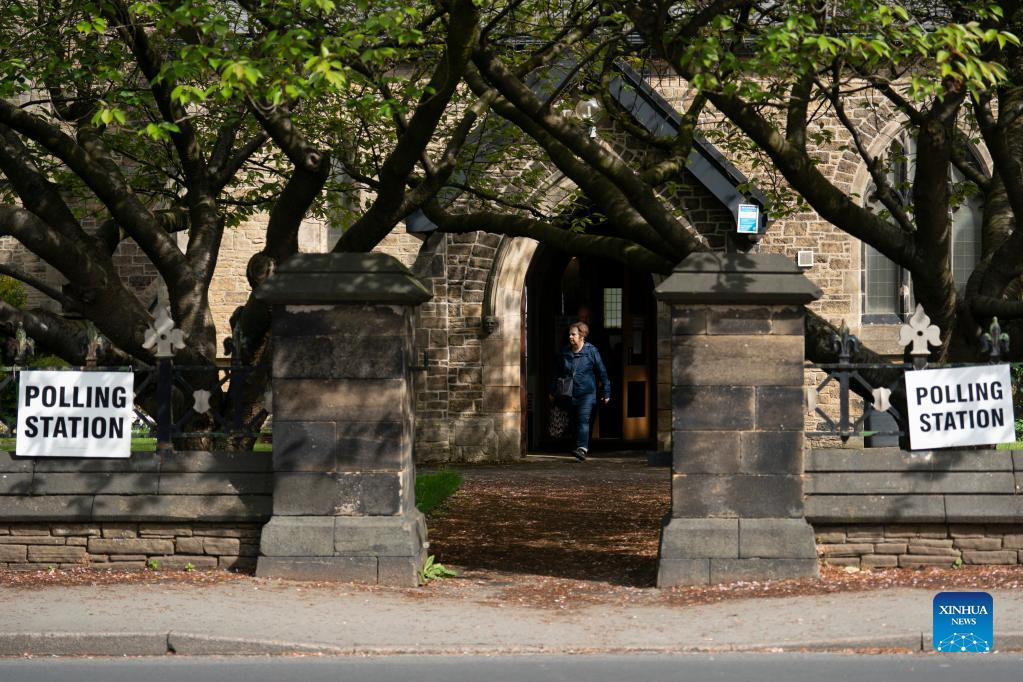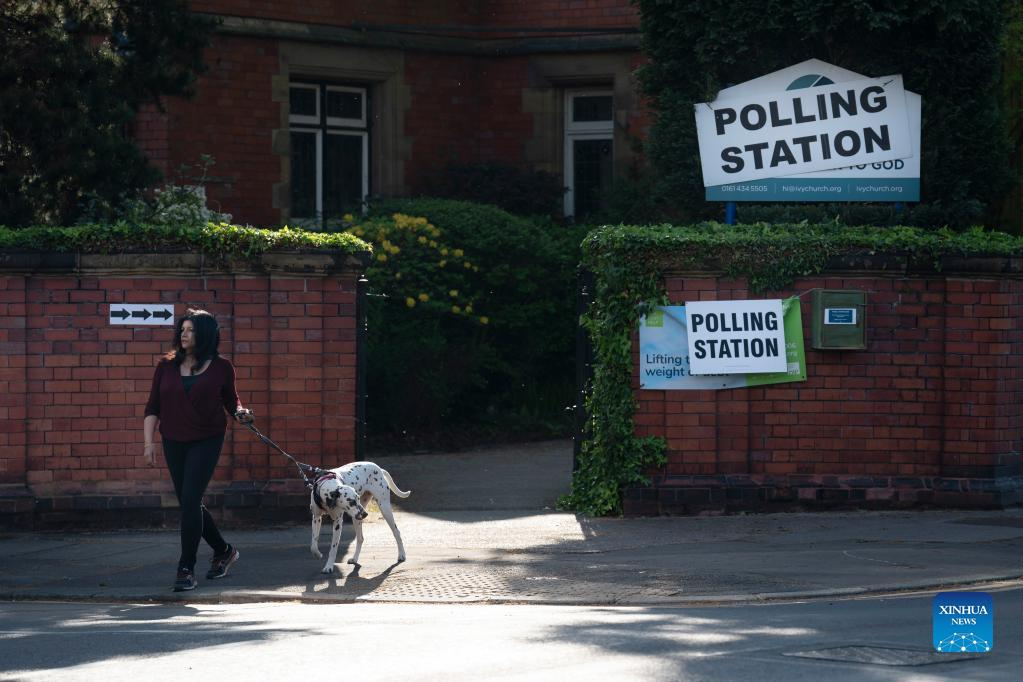
Staff count ballots for the local elections at Wandsworth, London, Britain, May 6, 2022. The United Kingdom's (UK) ruling Conservative Party lost some of its traditional strongholds in Thursday's local elections. (Xinhua/Li Ying)
LONDON, May 6 (Xinhua) -- The United Kingdom's (UK) ruling Conservative Party lost some of its traditional strongholds in Thursday's local elections. The vote has been considered to be a litmus test for the mid-term popularity of Prime Minister Boris Johnson, caught between the partygate scandal and surging inflation. However, the country's opposition parties have not made sufficient gains to change the tide in British politics.
On Thursday, voters decided thousands of council seats across the United Kingdom (UK), including all councils in Scotland, Wales and London, and several in the rest of England. In Northern Ireland, voters elected a new 90-seat Assembly.
The results announced on Friday showed that the Conservatives have lost over 300 council seats in England, including several strongholds in the capital. The Labour Party has seized control of the Westminster City Council in London for the first time since its creation in 1964, and the London borough of Wandsworth switched from Conservative to Labour for the first time in 44 years.
In Wales, the Conservatives have lost nearly 70 seats after 18 of the 22 councils have been declared. In Scotland, the Conservatives lost 62 seats, with the Scottish National Party (SNP) finishing as the largest party and the Labour coming second after gaining 19 seats.
The election came after months of turmoil for Johnson, during which he became the first sitting prime minister to be punished for breaking the law. Last month, he was fined for attending his own birthday party in June 2020 at Downing Street, when coronavirus restrictions imposed by him on the British public were in effect. A parliamentary investigation into whether he misled lawmakers over these illicit gatherings is also underway. Lying to Parliament is an offense in Britain that normally triggers resignation.
Moreover, Johnson's government has come under fire for not doing enough to soften the impact of a growing cost-of-living crisis as millions of people are coping with rising energy bills and food prices. The Bank of England expects inflation to rise to 9 percent in the second quarter of this year and then peak at "slightly over 10 percent" in the last quarter.
Professor Stuart Wilks-Heeg, a political expert at the University of Liverpool, told Xinhua: "These are real votes by real people. It gives us a good flavor of some of the issues which have been playing out in British politics recently, particularly around Boris Johnson and breaches of the COVID-19 regulations, and whether that was feeding through into how people would actually vote.
After seeing the council of the north London Borough of Barnet goes red for the first time in its history, its outgoing Tory leader, Daniel Thomas, said the loss was a "warning shot" to his party's leadership.
"They (Labour) won the council, if they win our parliamentary constituencies as well, then it doesn't bode well for us to form a government in future general elections," Thomas said.
Johnson admitted the Conservatives endured a "tough night" in England but insisted that his party faced "a mixed set of results" elsewhere.
Professor Iain Begg from the European Institute at the London School of Economics and Political Science told Xinhua that despite losses for the Conservatives, the key message is that "it's not a slap in the face for Boris Johnson."
"What we're seeing is a combination of some losses for the Conservative Party, but not decisive gains for the other parties in a way which would point to them being potential winners in a general election in two years," Begg said.
"Labour is consolidating its vote in areas like London and among the middle classes, but it does not yet seem to have cut through to its more traditional working-class supporters on a sufficient scale to enable it to be optimistic about the next general election (in 2024)," he added.
The Labour Party's joy was dampened by the announcement on Friday that its leader, Keir Starmer, will face a police probe into whether he broke lockdown rules while drinking with colleagues last year in Durham in northeast England.
Begg said that although the country's citizens may crave a change of leadership as the Conservatives have held on to power for too long, that sentiment alone is not enough to guarantee a seismic change in British politics.
In 2024, "the Conservatives will have been in power for nearly 15 years, and that's a long time for any party to be in government in the United Kingdom," Begg said. "It follows that the Conservatives are going to face the need to oppose a narrative that will say 'time for a change', so they need to provide something exceptional if they are going to overcome that.
"And yet, the opposition parties don't quite have an alternative. We are not quite at that breaking point where the country as a whole says now everything must change," he added.

Staff count ballots for the local elections at Wandsworth, London, Britain, May 6, 2022. The United Kingdom's (UK) ruling Conservative Party lost some of its traditional strongholds in Thursday's local elections. (Xinhua/Li Ying)

Staff count ballots for the local elections at Wandsworth, London, Britain, May 6, 2022. The United Kingdom's (UK) ruling Conservative Party lost some of its traditional strongholds in Thursday's local elections. (Xinhua/Li Ying)
 A woman leaves a polling station after casting her vote for the local elections in Manchester, Britain, May 5, 2022. The United Kingdom's (UK) ruling Conservative Party lost some of its traditional strongholds in Thursday's local elections. (Photo by Jon Super/Xinhua)
A woman leaves a polling station after casting her vote for the local elections in Manchester, Britain, May 5, 2022. The United Kingdom's (UK) ruling Conservative Party lost some of its traditional strongholds in Thursday's local elections. (Photo by Jon Super/Xinhua)

A woman leaves a polling station after casting her vote for the local elections in Manchester, Britain, May 5, 2022. The United Kingdom's (UK) ruling Conservative Party lost some of its traditional strongholds in Thursday's local elections. (Photo by Jon Super/Xinhua)



